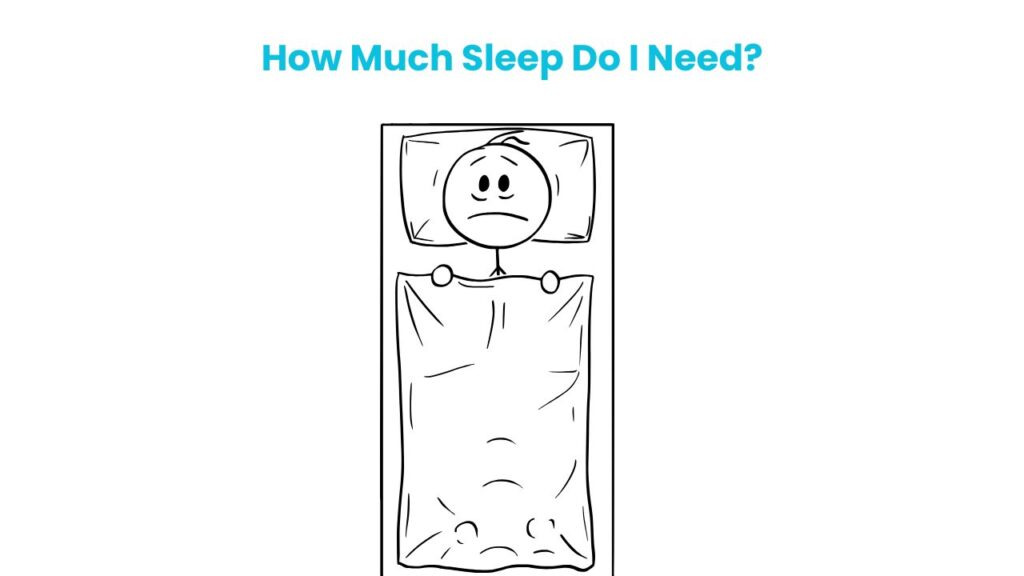How Much Sleep Do I Need? Want to feel fresh, think fast, and stay happy? Then sleep is your superpower. This guide explains how much sleep you need at different ages, how to find your best bedtime, and simple tips that actually work.
Why sleep matters
- Sleep is your body’s charging time. No sleep = low battery.
- Your brain cleans, repairs, and organizes memories while you sleep.
- Good sleep = better mood, focus, grades, sports, and skin.
Recommended sleep by age
Use this as your quick reference. These are healthy ranges, not strict rules. If you feel great within your range, you’re probably doing it right.
| Age group | Hours per night |
|---|---|
| Newborns (0–3 months) | 14–17 hours |
| Infants (4–11 months) | 12–15 hours |
| Toddlers (1–2 years) | 11–14 hours |
| Preschool (3–5 years) | 10–13 hours |
| School-age (6–12 years) | 9–12 hours |
| Teens (13–18 years) | 8–10 hours |
| Young adults (18–25 years) | 7–9 hours |
| Adults (26–64 years) | 7–9 hours |
| Older adults (65+ years) | 7–8 hours |
Quick bedtime finder (easy method)

Sleep works in cycles of about 90 minutes. Most people feel best after 4–6 full cycles, which is about 6–9 hours. If you know your wake‑up time, you can work backward.
- Add a small buffer for falling asleep: about 15 minutes.
- Try 4, 5, or 6 cycles and see which feels best.
Simple formula: Bedtime = Wake time − (cycles × 90 minutes) − 15 minutes In LaTeX: Bedtime=Wake−(C×90 min)−15 min\text{Bedtime} = \text{Wake} – (C \times 90\ \text{min}) – 15\ \text{min}
Want it done for you? Use our free tool: Sleep Calculator
Signs you need more sleep
- You need an alarm and hit snooze a lot.
- You feel foggy before noon or sleepy in class.
- You’re moody, snacky, or keep getting colds.
- Your reaction time is slow in sports or driving.
If these happen often, try going to bed 30–60 minutes earlier for a week.
Student sleep tips that actually help
- Keep a steady schedule. Same sleep and wake times every day (even weekends).
- Power down screens 60 minutes before bed. Blue light confuses your body clock.
- Create a calm bedroom: cool, dark, and quiet. Think cave vibes.
- Don’t study in bed. Bed = sleep zone, not homework zone.
- No heavy meals, tea/coffee/energy drinks near bedtime.
- Short naps are okay (10–20 minutes), but not after late afternoon.
Morning habits that make nights easier
- Get sunlight in the first hour after waking.
- Move your body (even a 10‑minute walk helps).
- Eat a balanced breakfast. Your body takes it as a “start the day” signal.
Common sleep mistakes
- Catching up on weekends by sleeping very late. This makes Mondays harder.
- Scrolling in bed. Your brain will link bed with alertness, not sleep.
- Going to bed too early when not sleepy. Wait till you feel drowsy, then go.
If your schedule is crazy (exams, Ramadan, shifts)
- Protect a core sleep block of at least 4.5–6 hours.
- Use a power nap (10–20 minutes) and one recovery night with 7–9 hours after tough days.
- Keep caffeine before lunch only; skip it after mid‑afternoon.
FAQs
Is 6 hours enough?
For most teens and adults, 6 hours is not enough. Try 7–9 hours (teens: 8–10 hours) and compare how you feel.
Can I oversleep?
Sleeping much longer than your range sometimes is okay after a busy week. If it happens often, check your routine or talk to a doctor.
Do naps count?
Short naps help alertness but don’t fully replace night sleep. Keep them early and short so nighttime sleep stays strong.
What if I can’t fall asleep?
Get out of bed after ~20 minutes. Do something calm in low light (read, breathe, stretch), then try again when sleepy.